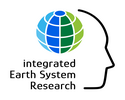
Mission
Humanity is increasingly influencing the Earth system that has evolved over millions of years. Visible signs of this 'Anthropocene' are global warming, pollution of the oceans and the decline in biodiversity.
In the coming years, therefore, societal decisions of civilization-historical significance will have to be made. A fundamental question is: How can the Earth system be ecologically stabilized in such a way that well-being, prosperity, justice, peace and security for all people are secured or even achieved?
Against this background, the Leibniz Research Network "Integrated Earth System Research" (iESF) has set itself the task of gaining knowledge about people in the Earth system that is relevant to society's actions. Above all, the ecological carrying capacities of the Earth system are determined, interrelations with the dynamics of society are identified, as well as alternative sustainable development paths are derived.
On the one hand, the network develops innovative principles of integrated Earth system research. On the other hand, it is currently investigating the theoretical foundations, methods and models of 'Integrated Earth System Research', atmosphere in the Earth system, oceans and their uses in the Earth system, water cycle and inland waters in the Earth system, biodiversity in the Earth system, bioeconomy in the Earth system, urban-rural relations in the earth system, environmental migration and security in the earth system and data and tools for 'integrated Earth system research'. Climate change is considered throughout.
